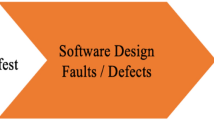Abstract
Context and Motivation: The correctness of software requirements is of critical importance to the success of a software project. Problems that occur during requirements collection and specification, if not fixed early, are costly to fix later. Therefore, it is important to develop approaches that help requirement engineers not only detect, but also prevent requirements problems. Because requirements engineering is a human-centric activity, we can build upon developments from the field of human cognition. Question/Problem: Human Errors are the failings of human cognition during the process of solving, planning, or executing a task. We have employed research about Human Errors to describe the types of problems that occur during requirements engineering. The goal of this paper is to determine whether knowledge of Human Errors can serve as a fault prevention mechanism during requirements engineering. Principal ideas/results: The results of our study show that a better understanding of human errors does lead developers to insert fewer problems into their own requirements documents. Our results also indicate that different types of Human Error information have different impacts on fault prevention. Contribution: In this paper, we show that the use of Human Error information from Cognitive Psychology is useful for fault prevention during requirements engineering.
Access this chapter
Tax calculation will be finalised at checkout
Purchases are for personal use only
Similar content being viewed by others
References
Systems and software engineering – vocabulary. ISO/IEC/IEEE 24765:2010(E), pp. 1–418, December 2010
Anu, V., Hu, W., Carver, J.C., Walia, G.S., Bradshaw, G.: Development of a human error taxonomy for software requirements: a systematic literature review. Technical report NDSU-CS-TR-16-001, North Dakota State University (2016). http://vaibhavanu.com/NDSU-CS/TR-16-001.pdf
Anu, V.K., Wali, G.S., Hu, W., Carver, J.C., Bradshaw, G.: Effectiveness of human error taxonomy during requirements inspection: an empirical investigation. In: 2016 International Conference on Software Engineering and Knowledge Engineering, pp. 531–536 (2016)
Card, D.N.: Learning from our mistakes with defect causal analysis. IEEE Softw. 15(1), 56–63 (1998)
Carver, J., Nagappan, N., Page, A.: The impact of educational background on the effectiveness of requirements inspections: an empirical study. IEEE Trans. Softw. Eng. 34(6), 800–812 (2008)
Chen, J.C., Huang, S.J.: An empirical analysis of the impact of software development problem factors on software maintainability. J. Syst. Softw. 82(6), 981–992 (2009)
Chillarege, R., Bhandari, I.S., Chaar, J.K., Halliday, M.J., Moebus, D.S., Ray, B.K., Wong, M.Y.: Orthogonal defect classification-a concept for in-process measurements. IEEE Trans. Softw. Eng. 18(11), 943–956 (1992)
Dethomas, A.: Technology requirements of integrated, critical digital flight systems. In: Guidance, Navigation and Control Conference, p. 2602 (1987)
Diller, T., Helmrich, G., Dunning, S., Cox, S., Buchanan, A., Shappell, S.: The human factors analysis classification system (HFACS) applied to health care. Am. J. Med. Qual. 29(3), 1062860613491623 (2013)
Freimut, B., Denger, C., Ketterer, M.: An industrial case study of implementing and validating defect classification for process improvement and quality management. In: 11th IEEE International Software Metrics Symposium, 10 p. IEEE (2005)
Grady, R.B.: Software failure analysis for high-return process improvement decisions. Hewlett Packard J. 47, 15–24 (1996)
Graham, M.: Software defect prevention using orthogonal defect prevention (2005)
Hamill, M., Goseva-Popstojanova, K.: Common trends in software fault and failure data. IEEE Trans. Softw. Eng. 35(4), 484–496 (2009)
Hayes, J.H.: Building a requirement fault taxonomy: experiences from a nasa verification and validation research project. In: 14th International Symposium on Software Reliability Engineering, pp. 49–59. IEEE (2003)
Hu, W., Carver, J.C., Anu, V., Walia, G., Bradshaw, G.: Detection of requirement errors and faults via a human error taxonomy: a feasibility study. In: 10th International Symposium on Empirical Software Engineering and Measurement (2016)
Kumaresh, S., Baskaran, R.: Experimental design on defect analysis in software process improvement. In: 2012 International Conference on Recent Advances in Computing and Software Systems (RACSS), pp. 293–298. IEEE (2012)
Lanubile, F., Shull, F., Basili, V.R.: Experimenting with error abstraction in requirements documents. In: Proceedings of the Fifth International Software Metrics Symposium, Metrics 1998, pp. 114–121. IEEE (1998)
Leszak, M., Perry, D.E., Stoll, D.: A case study in root cause defect analysis. In: Proceedings of the 22nd International Conference on Software Engineering, pp. 428–437. ACM (2000)
Masuck, C.: Incorporating a fault categorization and analysis process in the software build cycle. J. Comput. Sci. Coll. 20(5), 239–248 (2005)
Mays, R.G., Jones, C.L., Holloway, G.J., Studinski, D.P.: Experiences with defect prevention. IBM Syst. J. 29(1), 4–32 (1990)
Pooley, R., Senior, D., Christie, D.: Collecting and analyzing Web-based project metrics. IEEE Softw. 19(1), 52 (2002)
Reason, J.: Human Error. Cambridge University Press, New York (1990)
Terzakis, J.: Reducing requirements defect density by using mentoring to supplement training. Int. Adv. Intell. Sys. 6(1 & 2), 102–111 (2013)
Walia, G.S., Carver, J.C.: Using error abstraction and classification to improve requirement quality: conclusions from a family of four empirical studies. Empir. Softw. Eng. 18(4), 625–658 (2013)
Walia, G.S., Carver, J.C.: A systematic literature review to identify and classify software requirement errors. Inf. Softw. Technol. 51(7), 1087–1109 (2009)
Wiegmann, D., Faaborg, T., Boquet, A., Detwiler, C., Holcomb, K., Shappell, S.: Human error and general aviation accidents: a comprehensive, fine-grained analysis using HFACS. Technical report, DTIC Document (2005)
Acknowledgments
This work was supported by NSF awards 1421006 and 1423279.
Author information
Authors and Affiliations
Corresponding author
Editor information
Editors and Affiliations
Rights and permissions
Copyright information
© 2017 Springer International Publishing AG
About this paper
Cite this paper
Hu, W., Carver, J.C., Anu, V., Walia, G., Bradshaw, G. (2017). Defect Prevention in Requirements Using Human Error Information: An Empirical Study. In: Grünbacher, P., Perini, A. (eds) Requirements Engineering: Foundation for Software Quality. REFSQ 2017. Lecture Notes in Computer Science(), vol 10153. Springer, Cham. https://doi.org/10.1007/978-3-319-54045-0_5
Download citation
DOI: https://doi.org/10.1007/978-3-319-54045-0_5
Published:
Publisher Name: Springer, Cham
Print ISBN: 978-3-319-54044-3
Online ISBN: 978-3-319-54045-0
eBook Packages: Computer ScienceComputer Science (R0)




